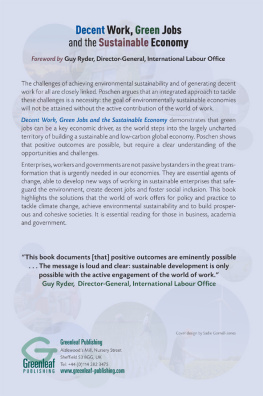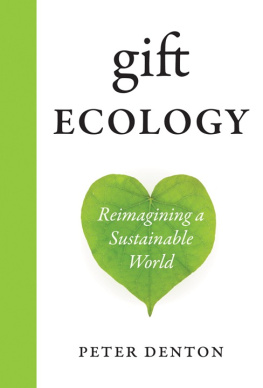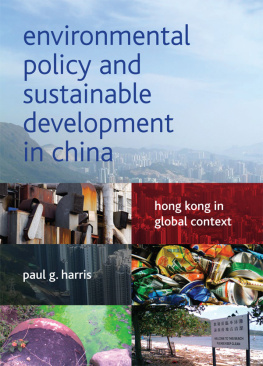
Decent Work, Green Jobs and
the Sustainable Economy
Solutions for Climate Change and
Sustainable Development

Copyright International Labour Organization 2015
The designations employed in ILO publications, which are in conformity with United Nations practice, and the presentation of material therein do not imply the expression of any opinion whatsoever on the part of the International Labour Office concerning the legal status of any country, area or territory or of its authorities, or concerning the delimitation of its frontiers.
The responsibility for opinions expressed in signed articles, studies and other contributions rests solely with their authors, and publication does not constitute an endorsement by the International Labour Office of the opinions expressed in them.
Reference to names of firms and commercial products and processes does not imply their endorsement by the International Labour Office, and any failure to mention a particular firm, commercial product or process is not a sign of disapproval.
Published by Greenleaf Publishing Limited
Aizlewoods Mill
Nursery Street
Sheffield S3 8GG
UK
www.greenleaf-publishing.com
ISBN-13: 978-1-78353-518-7 [hardback]
ISBN-13: 978-1-78353-449-4 [paperback]
ISBN-13: 978-1-78353-447-0 [PDF ebook]
ISBN-13: 978-1-78353-448-7 [ePub ebook]
in association with
International Labour Office
4, route des Morillons
CH-1211 Geneva 22
Switzerland
www.ilo.org
ISBN-13: 978-92-2-129638-6 [print]
ISBN-13: 978-92-2-129639-3 [PDF ebook]
ISBN-13: 978-92-2-129640-9 [ePub]
Cover by Sadie Gornall-Jones
Printed and bound by Printondemand-worldwide.com, UK
All rights reserved. No part of this publication may be reproduced, stored in a retrieval system, or transmitted, in any form or by any means, electronic, mechanical, photocopying, recording or otherwise, without the prior permission in writing of the publishers.
British Library Cataloguing in Publication Data:
A catalogue record for this book is available from the British Library.
Contents
Figures
Tables
Boxes
Foreword
Over the coming decades, humanity will confront a series of severe environmental and social challenges which interact in a variety of ways. They range from pollution and the deterioration of many natural resources to climate change, from persistent high unemployment, working poverty and rising inequality to the lack of even basic social protection for most working people in the world.
Climate change has begun to take a serious and rising toll on economies, well-being and human lives. Over the last decade, erratic weather patterns and extreme weather events have decimated infrastructure, disrupted business activity, destroyed jobs and livelihoods, and killed people around the world on an unprecedented scale. Climate change has become the main driver of forced migration.
The world of work has cause to worry.
The challenges of achieving environmental sustainability and of generating adequate and decent work for all are closely linked. They therefore need to be addressed jointly, rather than understood as separate issues, let alone as incompatible goals. The greening of economies presents many opportunities to achieve social objectives: it has the potential to be a new engine of growth, both in advanced and developing economies, and a net generator of decent green jobs that can contribute significantly to poverty eradication and social inclusion.
As this book documents with reference both to specific experiences and to macroeconomic studies, positive outcomes are eminently possible. Their attainment requires a clear understanding of both opportunities and challenges, as well as country-specific policies that integrate environmental,social and decent work elements to ensure a smooth and just transition process.
The greening of enterprises and jobs and the promotion of green jobs can foster a productive, low-carbon, environmentally sustainable economy and contribute to the fight against climate change. It can enhance the resilience of vulnerable countries and communities. Managed well, the transition to environmentally and socially sustainable economies can become a strong driver of job creation, job upgrading, social justice and poverty eradication.
The International Labour Organization (ILO) and its constituents around the world have raised their voice. The messageamply reflected and illustrated in this bookis loud and clear: sustainable development is only possible with the active engagement of the world of work. The actors in the world of workgovernments, employers and workersare not passive bystanders, but rather agents of change, who are able to develop new ways of working that safeguard the environment for present and future generations, eradicate poverty and promote social justice by fostering sustainable enterprises and creating decent work for all.
Their voices and their engagement are needed more than ever at this crucial juncture. Governments must agree the Sustainable Development Goals (SDGs), the first truly global development agenda. Governments must conclude a new global agreement on climate change. And it is also clear that environmentally sustainable economies will be achievable only if people are given a clear stake in them and if the important contributions of millions of employers and workers around the world are enabled and duly valued in the agreements and in their implementation.
The world of work needs to weigh in on policy-making and on greening and climate resilience in enterprises and workplaces. This task will only grow over the decades to come as the SDGs and the new climate agreement need to be implemented.
ILO core competencies on employment, skills, enterprise development, labour markets, social protection, labour rights and social dialogue all play key roles in successfully tackling climate change and achieving sustainable development.
In order to fully support our constituents in the world of work in this enormous endeavour, I have launched an ambitious and long-term green initiative to fully integrate the environmental dimension into everything the ILO does, from research and policy advice to social dialogue and capacity building.
The ILOs role in the transition to a low-carbon, sustainable development path will be the single factor that will most clearly distinguish the Organizations second century of activity from its first.
Guy Ryder
ILO Director-General
Acknowledgements
This book could not have been written without the help of a large number of colleagues. Michael Renner and Steven Tobin were co-authors of the report Working towards sustainable development published by the Green Jobs Initiative in 2012, which laid the conceptual foundations and much of the analytical groundwork for the book. Michael Renner, Daniel Samaan, Valentina Stoevska, Kees van der Ree, Marek Harsdorff and Kamal Gueye provided significant inputs for the report on Sustainable development, decent work and green jobs prepared for the International Labour Conference in 2013, on which this book builds. Mito Tsukamoto, Helmut Schwarzer and Olga Strietska reviewed the text and made valuable suggestions for improvements. Thanks are due to Raymond Torres, Werner Sengenberger and Jos Manuel Salazar-Xirinachs for their encouragement and constructive feedback. Dorit Kemter and Anna Maria Fyfe made sure graphs, figures and references were correct. Gillian Somerscales carried out the final edit with great attention to detail. Last but not least, Charlotte Beauchamp ably coordinated the production of the book. I am deeply grateful to these colleagues for their support, but even more for their commitment and contributions to turn inclusive sustainable economies into a reality.
Next page








